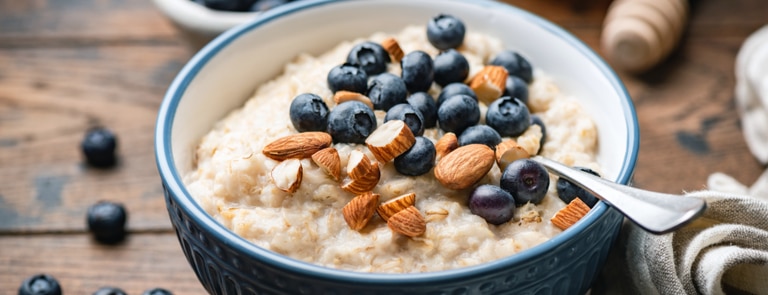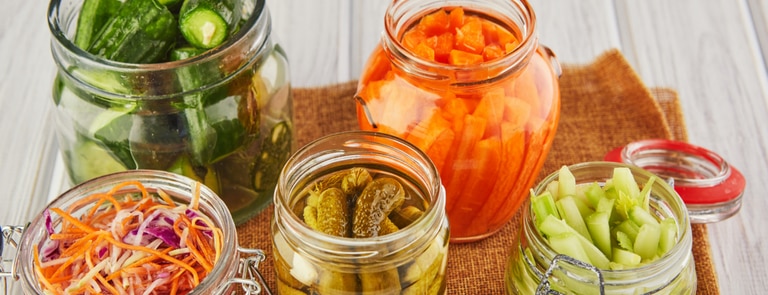Constipation advice: signs, causes & relief
Constipation can be embarrassing to talk about, so here’s all the info you need. Find out what’s normal, what’s not – and when to seek help.
Many of us have been constipated at some point, but if you get constipation on a regular basis – or it lasts more than a few days – there may be a medical reason that needs addressing.
Constipation can be painful and uncomfortable and something babies, children and adults can all experience.
It's estimated that around 1 in every 7 adults and up to 1 in every 3 children in the UK has constipation at any one time.1
Constipation affects twice as many women as men and is also more common in older adults and during pregnancy.2
This article lifts the lid on constipation – what it is and what causes it, and shares some practical constipation remedies we can all try to help get things moving again.
In this article, you’ll learn about
- What constipation is
- Symptoms of constipation
- What causes constipation
- Pregnancy and constipation
- 14 ways to deal with constipation
- How to get instant relief from constipation
- Constipation and fermented foods
What is constipation?
Constipation is when you’re unable to empty your bowels properly or you don’t pass stools regularly.3
Not everyone has a bowel movement every day, but constipation means going less often than is usual for you.
Medical guidelines define constipation as having three or fewer bowel movements a week.4
Constipation can last for a couple of days, which is usually nothing to worry about, but some people can go several weeks without emptying their bowels.
This is classed as chronic constipation.5
If left untreated, chronic constipation can lead to:
- Piles – caused by straining
- Impaction – when hardened stools get stuck in your intestines
- Small tears around your rectum – due to hard or very large stools
- Prolapsed rectum – triggered by severe straining6
Constipation is something that we can all experience on one or more occasions throughout our lives.
It’s extremely common and, generally speaking, is when you haven’t been able to go for a poo for a while.
According to guidance published by the NHS, you are constipated if you:
- Haven’t been able to pass any stools at least three times in the space of a week.
- Your poo is large and dry, hard or lumpy
- You are straining or in pain when you have a poo.
Constipation and bloating
When you suffer from constipation there tends to be a lot of gas in the bowel that can’t be expelled properly, which can make you feel bloated too.
Pre-menstrual bloating is common, and this is due to changes in hormone levels.
In the build-up to a period, the surge in the hormone progesterone tends to relax everything in the body so the bowel becomes much more sluggish, and less likely to push the motions through and out the other end.
It’s also the reason why women get constipated during pregnancy.
Bloating can also be a symptom of some specific gut health problems, such as irritable bowel syndrome (IBS), characterised by stomach cramping, constipation or diarrhoea, or alternating between both.

Constipation symptoms
How do I know if I have constipation?
What you consider normal bowel movements could be very different from another person.
However, there are a few signs that suggest you’re likely to be experiencing constipation:
- You’ve had fewer than three poos in a week
- Your stools are hard and dry
- You strain or feel pain during bowel movements
- You don’t feel you’ve had a complete bowel movement7
Other constipation symptoms may include:
- Dry, hard, lumpy stools
- Unusually small or large stools
- Bloating
- Stomachache
- Nausea
- Loss of appetite8
What causes constipation?
Our genes control how we react to body changes.
For instance, some women are more sensitive than others to fluctuations in hormones that lead to bloating and constipation during their menstrual cycle.
Stress also has an effect.
When we’re stressed and anxious, we often turn to unhealthy comfort food, which takes longer to digest.
We’re also less likely to be active, which slows down the action of the bowel, leading to constipation. In some people, stress directly slows down the activity of the bowel.
Stools are usually in the large intestine for an average of 40 hours, but if they remain in the bowel for too long, too much water is absorbed from food in the colon which makes stools hard, dry, and difficult to pass.
5 causes of constipation
The most common causes of constipation include:
- Diet and lifestyle – not eating enough fibre such as wholegrains and fruit and vegetables, a low fluid intake, not drinking enough fluids, and not getting enough exercise, can all contribute to a sluggish bowel.
- Changes to your routine – a new diet, a change in sleep routine, or going on holiday can disrupt your bowel habits, while a new job may mean you have less time to go to the loo and so ignore the urge to empty your bowels.
- Stress – stress can affect the hormonal activity in your gut, slowing down digestion. You may not be eating properly or drinking enough water too, which can also lead to constipation.
- Hormones – during pregnancy and before your period, there’s an increase in the hormone progesterone that relaxes your muscles and can make bowel movements more difficult.9,10,11,12
- Medication – some drugs, such as codeine, antidepressants and indigestion tables, have side-effects that include constipation, while overusing laxatives means your body may no long respond to them effectively.
Some other common types of medication that can cause constipation include:
-
-
- Aluminium antacids (medicine to treat indigestion).
- Antidepressants.
- Antiepileptics (medicine to treat epilepsy).
- Antipsychotics (medicine to treat schizophrenia and other mental health conditions).
- Calcium supplements.
- Opiate painkillers, such as codeine and morphine.
- Diuretics (water tablets).
- Iron supplements.13
-
It’s possible for people to experience one or more of these symptoms to various different effects when they are constipated.
Certain medical conditions may lead to constipation too, such as:
- Nervous system disorders like multiple sclerosis (MS) or Parkinson’s disease
- Irritable bowel syndrome (IBS)
- Hypothyroidism
- Depression114

Pregnancy and constipation
Around 2 in every 5 women experience constipation during the early stages of being pregnant.15
It happens during pregnancy because your body produces more of the female hormone progesterone, which acts as a muscle relaxant.16
The bowel normally moves stools and waste to the anus via a process called peristalsis.
This is when the muscles that line the bowel contract and relax in a rippling motion.
Increased progesterone makes it more difficult for the bowel muscles to contract and therefore more difficult to move waste products along.
What happens when you’re constipated for too long?
Generally speaking, because our bodies are different (bowel movements included) not everybody’s poo frequency is exactly the same.
Some people go once a day, twice a day or every other day; our toilet routines all vary.
However, if you’ve not been able to go for a poo for more than three days in a row, then you may be constipated.17
And if you’re unable to pass wind, have a tummy ache and are bloated too, then you should get it checked out by your GP.
These symptoms are all signs of a bowel obstruction.
When this happens, your faeces prevents blood from flowing into your colon, which causes stomach pain—and possibly tears— in your bowel.
Summary
- Constipation is extremely common; it’s when you haven’t been able to go for a poo at least three times in the space of a week
- Numerous things can cause constipation, including not eating enough fibre or drinking enough fluids
- Certain medication and early stage pregnancy can also cause constipation too
Who gets constipation?
Around one in seven adults and up to one in three children have constipation at any time, but it’s more common in women, pregnant women, young children and older adults.18
Getting older can make constipation more likely because your metabolism tends to slow down as you age, and you may not be as active.19
14 easy ways to ease constipation
Your lifestyle and eating habits can greatly affect your digestion, and it’s common to suffer from the symptoms of constipation.
But there’s plenty you can do to prevent constipation, or cure it if it does occur.
-
Gradually increase fibre
It produces gas, but also keeps the bowel moving – most of us don’t eat enough fibre, so up your intake of fresh fruits and vegetables and wholegrain foods.
Aim to eat 30g of fibre a day to keep things moving, but increase the amount of fibre gradually so your gut can adapt.
-
Watch out for fatty foods
Limit fatty, low-fibre foods such as deep-fried fast foods, which can slow down digestion.20
-
Go when you need to
Don’t ignore the urge to go to the loo. Raising your knees above your hips by putting your feet on a footstool can also make it easier to empty your bowels.21
-
Drink up
Water helps lubricate your digestive system and allows the smooth passage of food through the digestive tract, keeping constipation symptoms at bay.
It also keeps stools soft, so it’s important to drink plenty of fluids throughout the day.
Aim to drink at least one-and-a-half litres of water a day, and reduce hydration ‘robbers’ such as caffeine, alcohol and fizzy or sugary drinks.
Drink plenty of fluid to help prevent stools hardening, but not alcohol or caffeine, which can be dehydrating.22
-
Don’t eat in a rush
Wolfing down food means it isn’t chewed properly. The gut then has to process larger pieces, which takes longer and can cause constipation symptoms.
It takes, on average, six to eight hours for food to pass through your stomach and small intestine, and around 53 hours to go from mouth to toilet. So eat slowly – you’ll enjoy your food more, too!
-
Get regular exercise
The quicker you burn calories, the faster your metabolic rate will be, so the quicker you’ll convert food into energy.
Staying active also helps stimulate the bowel, which speeds up food transit time, avoiding constipation.
-
Have breakfast
This helps the colon start to contract, which can help regulate your bowel habit, avoiding constipation.
Try porridge with a sprinkling of nuts and fresh fruit or rye toast topped with a nut butter and mashed banana. Limit your caffeine too: have a glass of juice or soy milk instead.

-
Try magnesium
Constipation can be related to low magnesium levels. Fill up on magnesium-rich green leafy veg, beans, lentils and wholegrains – all good fibre foods – or try a supplement.
You could also bathe in Epsom salts, as your body can absorb the magnesium in them through the skin.
-
Take a natural approach
Psyllium husks act to soften the stool making it easier to pass. Capsicum has been shown to have a gentle stimulant effect on digestive function, helping to provide constipation relief.
-
Eat some oat bran
Add some wheat bran, oats or linseed to your daily diet.
They can also help get your bowel moving again.
Oats are loaded with soluble fibre, which allows more water to remain in the stool, making it softer and larger and easier to pass.23
Meanwhile, wheat bran helps constipation by also increasing stool volume, the rate of bowel movement and frequency.24
-
Drink your tea
One of the best ways to ease symptoms after a meal is with a tea. Peppermint is known as an anti-acid and a digestive aid, while chamomile is a great stress soother.
-
Get into a routine
Follow a regular routine.
Going to the toilet at a similar time every day and giving yourself plenty of time to use the toilet can potentially help you get back into a rhythm when it comes to your toilet habits.25
-
Have a hot drink in the morning
Drink a hot drink in the morning, preferably coffee.
The heat from the coffee can stimulate bowel movement, while the caffeine is believed to be a particularly effective way of stimulating your colon.26
-
Try some massage
Gently massage your belly. Applying moderate pressure to and massaging your abdomen in a clockwise direction can help move your bowels.
Colonic massage can also help with constipation too.27
How can I relieve constipation quickly?
Giving the natural remedies for constipation up above a go can potentially give you instant relief, but there’s no saying how soon it will be.
What’s more, it all depends on how long you’ve been constipated for, how bad your constipation is, and what your natural bowel movements are usually like.
However, if you’ve given all of the remedies above a go, and still haven’t passed anything, you could see your GP or possibly try an over the counter laxative.
Polyethylene glycol 3350 is made up of compounds that aren’t digested or absorbed by the body, causing a diarrheal effect when taken.28
But if you’re not really having much luck with natural remedies, it’s best you see your GP before you try anything else.
They will be able to advise you on the safest solution, which could be an over the counter or prescription laxative or something else.
Alternatively, you could always try a natural laxative, such as raisins, prunes or figs, which contain plenty of insoluble and soluble fibre, which have a positive duel effect on the bowel.
Soluble fibre binds with fatty acid, forming a gel, which slows the emptying time within the stomach.
When food digests more slowly, you feel full longer – which is useful if you're trying to eat less or lose weight.
Insoluble fibre forms a bulky stool that moves more quickly through the gastrointestinal tract. Insoluble fibre passes essentially unchanged through the stool.29
Summary
- There are lots of natural remedies for constipation relief
- They include exercising, eating more fibre and staying hydrated (not with fizzy or alcoholic drinks)
- Laxatives – natural, over the counter and prescription - can help with constipation too
If your constipation doesn’t improve after trying the tips above, or you are concerned, see your GP.
You should make an urgent appointment if you also experience bloody stools or notice blood on the toilet paper, you’re always tired, or you’ve lost your appetite or a lot of weight for no obvious reason.30

Can fermented foods help with constipation symptoms?
Constipation happens in your large intestine.
This long muscular tube heads up your gut’s mission to absorb water and flush out waste.
But if this movement doesn’t happen and faeces sits there for too long, stools become hard and difficult to pass.
Fermented foods can help create an environment in your gut that prevents this from happening.
The gut contains a diverse collection of trillions of bacteria. 95% of these microbes are in your colon.
It’s called a microbiome, and it helps to break down food and regulate bowel function.
When you’re constipated, it may be a sign there could be an imbalance between friendly bacteria and the bad species in your large intestine.
Fermented foods help by topping up the level of good bacteria in the gut, which reduces the impact of the less friendly varieties.
However, there are causes of constipation other than an imbalance in gut bacteria. So, some trial and error may be required.
What are fermented foods?
The trend for fermented foods is not going anywhere.
If anything, the evidence to support their nutritional value is growing their profile in discussions around gut health.
So, if you’re looking for foods that could help with constipation, consider putting live yoghurts, kefir, sauerkraut, kimchi, pickles, tempeh, natto, miso, and kombucha on your shopping list.31
But what makes these foods such a powerful elixir for rebalancing digestive discomfort? It’s primarily down to their probiotic content.
Fermentation not only extends the shelf life of foods, but it also adds nutritional value. Yes, fermented foods are packed with live, good bacteria.
It’s important to note the probiotic bacteria must be alive when you eat it. Food processes, such as pasteurisation, smoking, baking and filtering kill live bacteria.
This removes soy sauces, most beers and wines, sourdough bread, and chocolate from your list of fermented superfoods, unfortunately.
It’s also important that yoghurts are ‘live’ or contain ‘active’ ingredients. And you should choose unpasteurised sauerkraut and select fermented pickles rather than ones soaked in vinegar.
DIY fermentation
Are you ready to add fermented foods to your diet? What better way to make sure all the live, friendly bacteria goodness is preserved than by fermenting your own foods.
There are some great recipes for kimchi and sauerkraut, but kefir is an easy place to start your fermenting journey.
Kefir contains around 20 different types of bacteria and yeast.32 It’s a rich source of probiotics with a wealth of research backing its effectiveness on aiding digestion.
Simply buy the kefir grain, add milk and then leave it out to ferment for around 12 hours. Then it’s ready to drink.
Are you ready to try fermented foods?
As well as being a rich probiotic source, fermented foods are also a great way to add some healthy diversity to your diet.
So, while adding live yoghurt to your meals may be the easiest option, there is so much more to experiment with.
Try pickled vegetables as a side or as a topping for your salads. And why not add a little sauerkraut to your sandwich to give your lunch some extra excitement.
Takeaway
Constipation can affect us all, and aside from not being able to poo, it can also lead to other side effects, such as bloating, tummy ache and sickness.
Where possible, try to avoid becoming constipated by eating a healthy and balanced diet, staying active, not putting off going to the toilet and being aware of what your routine is.
All of these things can help prevent you from becoming constipated. However, sometimes it can still happen.
If you find you haven’t had any bowel movements for three consecutive days, speak to your GP or medical professional for advice on how you can get things moving again.
The advice in this article is for information only and should not replace medical care. Please check with your GP or healthcare professional before trying any supplements, treatments or remedies. Food supplements must not be used as a substitute for a varied and balanced diet and a healthy lifestyle.
Last updated: 18 February 2022
Sources
- https://www.nhsinform.scot/illnesses-and-conditions/stomach-liver-and-gastrointestinal-tract/constipation
- https://www.nhsinform.scot/illnesses-and-conditions/stomach-liver-and-gastrointestinal-tract/constipation
- https://www.nhsinform.scot/illnesses-and-conditions/stomach-liver-and-gastrointestinal-tract/constipation#about-constipation
- https://www.nature.com/subjects/constipation
- https://www.cancerresearchuk.org/about-cancer/coping/physically/bowel-problems/types/chronic-constipation
- https://www.nhsinform.scot/illnesses-and-conditions/stomach-liver-and-gastrointestinal-tract/constipation
- https://www.nhs.uk/conditions/constipation/
- https://www.nhsinform.scot/illnesses-and-conditions/stomach-liver-and-gastrointestinal-tract/constipation#symptoms-of-constipation
- https://www.nhs.uk/conditions/constipation/
- https://www.gov.uk/government/publications/constipation-and-people-with-learning-disabilities/constipation-making-reasonable-adjustments
- https://www.nct.org.uk/pregnancy/worries-and-discomforts/common-discomforts/constipation-pregnancy-haemorrhoids-and-anal-fissures
- https://www.nhsinform.scot/illnesses-and-conditions/stomach-liver-and-gastrointestinal-tract/constipation#causes-of-constipation
- https://www.nhsinform.scot/illnesses-and-conditions/stomach-liver-and-gastrointestinal-tract/constipation
- https://www.nhsinform.scot/illnesses-and-conditions/stomach-liver-and-gastrointestinal-tract/constipation#causes-of-constipation
- https://obgyn.onlinelibrary.wiley.com/doi/10.1111/1471-0528.16559
- https://www.nhsinform.scot/illnesses-and-conditions/stomach-liver-and-gastrointestinal-tract/constipation
- https://www.menshealth.com/health/a26961259/how-long-can-i-go-without-pooping/
- https://www.nhsinform.scot/illnesses-and-conditions/stomach-liver-and-gastrointestinal-tract/constipation#about-constipation
- https://www.ncbi.nlm.nih.gov/pmc/articles/PMC2818133/
- https://www.ncbi.nlm.nih.gov/pubmed/26176421
- https://www.nhsinform.scot/illnesses-and-conditions/stomach-liver-and-gastrointestinal-tract/constipation#causes-of-constipation
- https://www.nap.edu/catalog/10925/dietary-reference-intakes-for-water-potassium-sodium-chloride-and-sulfate
- https://www.piedmont.org/living-better/5-foods-that-relieve-constipation
- https://www.ncbi.nlm.nih.gov/pmc/articles/PMC3507301/
- https://www.nhs.uk/conditions/constipation/
- https://www.womenshealthmag.com/health/a19984082/how-to-make-yourself-poop/
- https://www.womenshealthmag.com/health/a19984082/how-to-make-yourself-poop/
- https://www.womenshealthmag.com/health/a19984082/how-to-make-yourself-poop/
- https://healthyeating.sfgate.com/figs-good-bowels-3114.html
- https://www.nhs.uk/conditions/constipation/
- https://isappscience.org/for-scientists/resources/fermented-foods/
- https://www.theguthealthdoctor.com/all-articles/10-step-gut-makeover-plan-healthy-gut?rq=probiotics